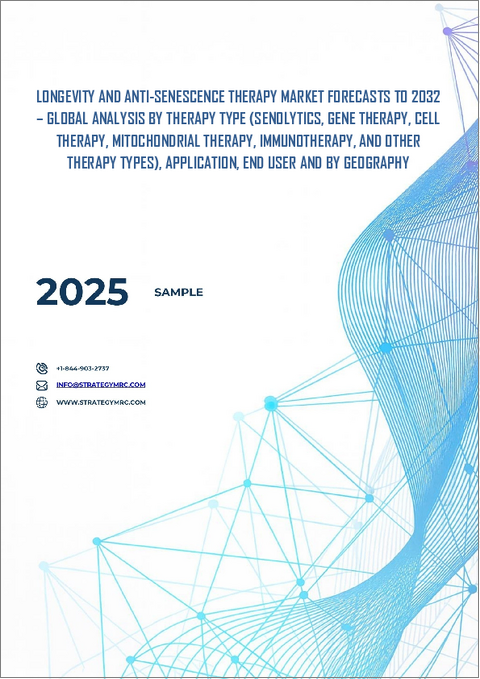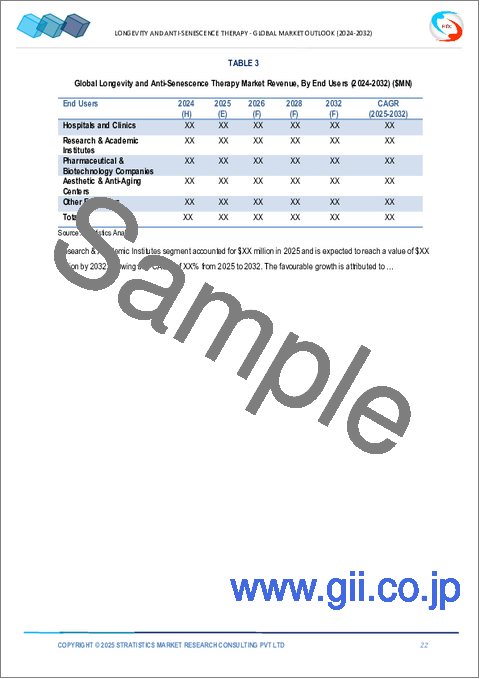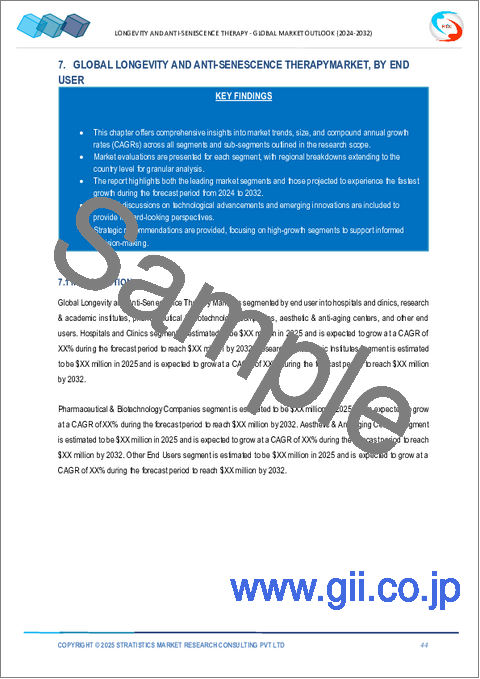|
|
市場調査レポート
商品コード
1798008
長寿・抗老化療法市場の2032年までの予測: 療法タイプ別、用途別、エンドユーザー別、地域別の世界分析Longevity and Anti-Senescence Therapy Market Forecasts to 2032 - Global Analysis By Therapy Type (Senolytics, Gene Therapy, Cell Therapy, Mitochondrial Therapy, Immunotherapy, and Other Therapy Types), Application, End User and By Geography |
||||||
カスタマイズ可能
|
|||||||
| 長寿・抗老化療法市場の2032年までの予測: 療法タイプ別、用途別、エンドユーザー別、地域別の世界分析 |
|
出版日: 2025年08月07日
発行: Stratistics Market Research Consulting
ページ情報: 英文 200+ Pages
納期: 2~3営業日
|
全表示
- 概要
- 図表
- 目次
Stratistics MRCによると、世界の長寿・抗老化療法市場は2025年に370億5,000万米ドルを占め、予測期間中のCAGRは8.1%で成長し、2032年には639億1,000万米ドルに達すると予測されています。
長寿・抗老化療法とは、老化に関連する生物学的プロセスを標的とすることで、寿命の延長と加齢による健康状態の改善を目的とした一連の医療介入を指します。これらの治療法は、加齢関連疾患の発症を遅らせ、細胞機能を強化し、全体的な活力を促進することに焦点を当てています。細胞障害や炎症といった老化の根本的なメカニズムに対処することで、これらの治療法は生活の質を改善し、健康寿命を延ばそうとするものです。
米国心臓協会のデータによると、2020年、米国では平均40秒に1人が脳卒中を発症し、19人に1人が死亡するとされています。
アンチエイジング製品に対する消費者の意識の高まり
世界の人々の健康意識が高まり、加齢に関連する病気や目に見える老化の兆候についての情報が増えるにつれ、効果的な治療法や製品に対する需要が急増しています。ソーシャル・メディア、オンライン・ヘルス・プラットフォーム、広範なマーケティングにより、抗老化薬、サプリメント、再生療法などの革新的な解決策に関する消費者の啓蒙が進んでいます。このような意識は、予防対策やライフスタイルの強化の早期導入を促しています。さらに、寿命だけでなく健康寿命を延ばすことへの関心の高まりが、エビデンスに基づくアンチエイジング製品への消費者の投資を促し、市場全体の成長とイノベーションを促進しています。
最先端治療のコスト高
遺伝子治療、幹細胞治療、抗老化薬などの最先端治療には、複雑な開発プロセス、高額な臨床試験、特殊な設備が必要とされることが多く、その結果、価格も高騰します。このようなコストは、特に中低所得地域において、人口の大部分にとって治療へのアクセスを困難にしています。さらに、保険適用や償還の選択肢が限られていることも、患者の経済的な負担をさらに妨げています。その結果、アンチエイジング・ソリューションへの関心は高まっているもの、経済的負担の大きさが普及と市場拡大の障壁となっています。
遠隔医療とデジタルヘルスソリューションの拡大
バーチャルヘルスケアプラットフォームへのアクセスが増加するにつれ、患者は専門医に相談したり、個人に合わせたアンチエイジング治療計画にアクセスしたり、健康指標を遠隔でモニターしたりできるようになりました。このデジタル変革は、予防ケア、ライフスタイル指導、慢性疾患管理の提供を強化するものであり、長寿に焦点を当てた治療の重要な要素です。ウェアラブルデバイスやモバイルヘルスアプリは、老化に関連するバイオマーカーのリアルタイム追跡を可能にし、積極的な健康管理を促します。消費者が遠隔ヘルスケアを受け入れる中、遠隔医療は、長寿治療の範囲と影響を世界的に拡大するための、便利で費用対効果の高いチャネルとして役立っています。
陳腐化につながる急速な技術革新
現在の治療法に多額の投資を行っている企業は、より新しく効果的なソリューションが登場するにつれて、自社製品が時代遅れになる可能性があります。この絶え間ない進化は、継続的な研究開発費、規制への適応、戦略的機敏性を要求するため、中小企業には負担がかかり、商業化が遅れる可能性があります。さらに、ヘルスケアプロバイダーは、すぐに追い越される可能性のある治療法の採用をためらい、市場浸透に影響を与える可能性があります。その結果、技術革新の急速なペースはエキサイティングである一方、不確実性をもたらし、競争圧力を強め、安定した市場成長を阻害する可能性があります。
COVID-19の影響:
COVID-19パンデミックは当初、臨床試験が延期されサプライチェーンが混乱に直面したため、長寿・抗老化療法市場の成長を鈍化させました。ヘルスケアの優先順位は当面の危機管理にシフトし、加齢に関連する治療がおろそかになりました。このような挫折にもかかわらず、パンデミックは健康寿命を延ばし、老化関連リスクに対処する必要性を強調し、この分野への新たな注目と資金提供を呼び起こしました。状況が正常化するにつれて、再生医療や予防医療への取り組みがより重視されるようになり、市場は回復し始めました。
予測期間中、老人性薬物療法分野が最大となる見込み
老化や慢性疾患につながる有害な老化細胞を除去する可能性があることから、予測期間中、老人溶解薬物療法分野が最大の市場シェアを占めると予想されます。加齢に関連した健康問題の開発、アンチエイジング治療への関心の高まり、AIを活用した薬剤開発の進展が成長を後押ししています。低分子老化治療薬や植物由来の化合物のような革新的な技術が人気を集めています。心血管系疾患や認知症などの疾患を対象とした活発な臨床試験を通じて、バイオテクノロジー企業や製薬企業からの資金援助の増加に後押しされ、大きな進歩がもたらされつつあります。
予測期間中、CAGRが最も高くなると予想されるのは病院・診療所分野です。
予測期間中、病院・診療所分野は、慢性疾患患者の増加、人口動態の高齢化、予防医療へのシフトに牽引され、最も高い成長率を示すと予測されます。抗老化薬、幹細胞治療、遺伝子介入などの最先端技術が治療戦略を再構築しています。AIを活用した医薬品開発やオーダーメイドの高齢化対策といった動向も勢いを増しています。注目すべき進展としては、心臓疾患や脳疾患に対する臨床試験が挙げられ、バイオテクノロジーへの資金提供の増加や、ヘルスケア主導のイノベーションを後押しする規制の整備が進んでいます。
最大のシェアを占める地域:
予測期間中、アジア太平洋地域は、高齢化、慢性疾患の急増、積極的な健康管理への関心の高まりに後押しされ、最大の市場シェアを占めると予想されます。老化治療、遺伝子編集、幹細胞治療、ミトコンドリア修復などの先端技術が人気を集めています。AIを活用した医薬品開発、オーダーメイドの老化治療、再生アプローチといった動向が台頭しています。主な進歩としては、心臓病や脳疾患に関する臨床研究、バイオテクノロジーへの資金提供の増加、健康的な加齢イノベーションを促進する政府の好意的な取り組みなどが挙げられます。
CAGRが最も高い地域:
予測期間中、北米地域は高齢化、慢性的な健康問題の増加、予防医学への関心の高まりに後押しされ、最も高いCAGRを示すと予測されます。老化治療、遺伝子編集、幹細胞応用、ミトコンドリア治療などの最先端技術が最前線にあります。注目すべき動向としては、AIを活用した医薬品開発、カスタマイズされた老化介入、再生ソリューションなどが挙げられます。バイオテクノロジーへの資金提供の拡大、脳疾患や心臓疾患を対象とした臨床研究、イノベーションを推進する学術機関と製薬企業の強力なパートナーシップなど、大きな進展が見られます。
無料カスタマイズサービス:
本レポートをご購読のお客様には、以下の無料カスタマイズオプションのいずれかをご利用いただけます:
- 企業プロファイル
- 追加市場企業の包括的プロファイリング(3社まで)
- 主要企業のSWOT分析(3社まで)
- 地域セグメンテーション
- 顧客の関心に応じた主要国の市場推計・予測・CAGR(注:フィージビリティチェックによる)
- 競合ベンチマーキング
- 製品ポートフォリオ、地理的プレゼンス、戦略的提携に基づく主要企業のベンチマーキング
目次
第1章 エグゼクティブサマリー
第2章 序文
- 概要
- ステークホルダー
- 調査範囲
- 調査手法
- データマイニング
- データ分析
- データ検証
- 調査アプローチ
- 調査資料
- 1次調査資料
- 2次調査情報源
- 前提条件
第3章 市場動向分析
- 促進要因
- 抑制要因
- 機会
- 脅威
- 用途分析
- エンドユーザー分析
- 新興市場
- COVID-19の影響
第4章 ポーターのファイブフォース分析
- 供給企業の交渉力
- 買い手の交渉力
- 代替品の脅威
- 新規参入業者の脅威
- 競争企業間の敵対関係
第5章 世界の長寿・抗老化療法市場:療法タイプ別
- セノリティクス
- 低分子老化抑制薬
- 老化細胞除去療法の併用
- 天然セノリティクス
- 遺伝子治療
- CRISPRベースの遺伝子治療
- ウイルスベクター遺伝子治療
- 細胞療法
- 幹細胞療法
- 再生細胞療法
- ミトコンドリア療法
- 免疫療法
- その他の治療法
第6章 世界の長寿・抗老化療法市場:用途別
- 心血管疾患
- 神経変性疾患
- がん
- 筋骨格系障害
- 皮膚科および美容への応用
- 代謝障害
- その他の用途
第7章 世界の長寿・抗老化療法市場:エンドユーザー別
- 病院と診療所
- 研究・学術機関
- 製薬・バイオテクノロジー企業
- 美容・アンチエイジングセンター
- その他のエンドユーザー
第8章 世界の長寿・抗老化療法市場:地域別
- 北米
- 米国
- カナダ
- メキシコ
- 欧州
- ドイツ
- 英国
- イタリア
- フランス
- スペイン
- その他欧州
- アジア太平洋
- 日本
- 中国
- インド
- オーストラリア
- ニュージーランド
- 韓国
- その他アジア太平洋
- 南米
- アルゼンチン
- ブラジル
- チリ
- その他南米
- 中東・アフリカ
- サウジアラビア
- アラブ首長国連邦
- カタール
- 南アフリカ
- その他中東・アフリカ
第9章 主な発展
- 契約、パートナーシップ、コラボレーション、ジョイントベンチャー
- 買収と合併
- 新製品発売
- 事業拡大
- その他の主要戦略
第10章 企業プロファイリング
- Calico Life Sciences
- Unity Biotechnology
- Juvenescence Ltd.
- BioAge Labs
- Sierra Sciences
- Oisin Biotechnologies
- Bristol-Myers Squibb
- Merck & Co., Inc.
- AgeX Therapeutics, Inc.
- AbbVie Inc.
- Altos Labs Inc.
- Bayer AG
- CohBar
- Life Biosciences, Inc.
- Insilico Medicine
List of Tables
- Table 1 Global Longevity and Anti-Senescence Therapy Market Outlook, By Region (2024-2032) ($MN)
- Table 2 Global Longevity and Anti-Senescence Therapy Market Outlook, By Therapy Type (2024-2032) ($MN)
- Table 3 Global Longevity and Anti-Senescence Therapy Market Outlook, By Senolytics (2024-2032) ($MN)
- Table 4 Global Longevity and Anti-Senescence Therapy Market Outlook, By Small Molecule Senolytics (2024-2032) ($MN)
- Table 5 Global Longevity and Anti-Senescence Therapy Market Outlook, By Combination Senolytic Treatments (2024-2032) ($MN)
- Table 6 Global Longevity and Anti-Senescence Therapy Market Outlook, By Natural Senolytics (2024-2032) ($MN)
- Table 7 Global Longevity and Anti-Senescence Therapy Market Outlook, By Gene Therapy (2024-2032) ($MN)
- Table 8 Global Longevity and Anti-Senescence Therapy Market Outlook, By CRISPR-Based Gene Therapy (2024-2032) ($MN)
- Table 9 Global Longevity and Anti-Senescence Therapy Market Outlook, By Viral Vector Gene Therapy (2024-2032) ($MN)
- Table 10 Global Longevity and Anti-Senescence Therapy Market Outlook, By Cell Therapy (2024-2032) ($MN)
- Table 11 Global Longevity and Anti-Senescence Therapy Market Outlook, By Stem Cell Therapy (2024-2032) ($MN)
- Table 12 Global Longevity and Anti-Senescence Therapy Market Outlook, By Regenerative Cell Therapy (2024-2032) ($MN)
- Table 13 Global Longevity and Anti-Senescence Therapy Market Outlook, By Mitochondrial Therapy (2024-2032) ($MN)
- Table 14 Global Longevity and Anti-Senescence Therapy Market Outlook, By Immunotherapy (2024-2032) ($MN)
- Table 15 Global Longevity and Anti-Senescence Therapy Market Outlook, By Other Therapy Types (2024-2032) ($MN)
- Table 16 Global Longevity and Anti-Senescence Therapy Market Outlook, By Application (2024-2032) ($MN)
- Table 17 Global Longevity and Anti-Senescence Therapy Market Outlook, By Cardiovascular Diseases (2024-2032) ($MN)
- Table 18 Global Longevity and Anti-Senescence Therapy Market Outlook, By Neurodegenerative Diseases (2024-2032) ($MN)
- Table 19 Global Longevity and Anti-Senescence Therapy Market Outlook, By Cancer (2024-2032) ($MN)
- Table 20 Global Longevity and Anti-Senescence Therapy Market Outlook, By Musculoskeletal Disorders (2024-2032) ($MN)
- Table 21 Global Longevity and Anti-Senescence Therapy Market Outlook, By Dermatology and Aesthetic Applications (2024-2032) ($MN)
- Table 22 Global Longevity and Anti-Senescence Therapy Market Outlook, By Metabolic Disorders (2024-2032) ($MN)
- Table 23 Global Longevity and Anti-Senescence Therapy Market Outlook, By Other Applications (2024-2032) ($MN)
- Table 24 Global Longevity and Anti-Senescence Therapy Market Outlook, By End Users (2024-2032) ($MN)
- Table 25 Global Longevity and Anti-Senescence Therapy Market Outlook, By Hospitals and Clinics (2024-2032) ($MN)
- Table 26 Global Longevity and Anti-Senescence Therapy Market Outlook, By Research & Academic Institutes (2024-2032) ($MN)
- Table 27 Global Longevity and Anti-Senescence Therapy Market Outlook, By Pharmaceutical & Biotechnology Companies (2024-2032) ($MN)
- Table 28 Global Longevity and Anti-Senescence Therapy Market Outlook, By Aesthetic & Anti-Aging Centers (2024-2032) ($MN)
- Table 29 Global Longevity and Anti-Senescence Therapy Market Outlook, By Other End Users (2024-2032) ($MN)
Note: Tables for North America, Europe, APAC, South America, and Middle East & Africa Regions are also represented in the same manner as above.
According to Stratistics MRC, the Global Longevity and Anti-Senescence Therapy Market is accounted for $37.05 billion in 2025 and is expected to reach $63.91 billion by 2032 growing at a CAGR of 8.1% during the forecast period. Longevity and anti-senescence therapy refers to a range of medical interventions aimed at extending lifespan and improving health during aging by targeting the biological processes associated with senescence. These therapies focus on delaying the onset of age-related diseases, enhancing cellular function, and promoting overall vitality. By addressing the underlying mechanisms of aging, such as cellular damage and inflammation, these therapies seek to improve quality of life and increase the healthy years of life.
According to the data of American Heart Association, in 2020, average person in the U.S. has a stroke every 40 seconds, accounting for one out of every 19 deaths.
Market Dynamics:
Driver:
Increased consumer awareness of anti-aging products
As global populations become more health-conscious and informed about age-related diseases and visible signs of aging, demand for effective therapies and products has surged. Social media, online health platforms, and widespread marketing have further educated consumers about innovative solutions such as senolytics, supplements, and regenerative therapies. This awareness encourages early adoption of preventive measures and lifestyle enhancements. Moreover, the growing interest in extending healthspan rather than just lifespan is fueling consumer investment in evidence-based anti-aging products, driving growth and innovation across the market.
Restraint:
High costs of advanced therapies
Cutting-edge treatments such as gene therapy, stem cell therapy, and senolytic drugs often involve complex development processes, expensive clinical trials, and specialized equipment, leading to elevated pricing. These costs make such therapies inaccessible to a large portion of the population, particularly in low- and middle-income regions. Additionally, limited insurance coverage and reimbursement options further hinder patient affordability. As a result, despite growing interest in anti-aging solutions, the high financial burden remains a barrier to widespread adoption and market expansion.
Opportunity:
Expansion of telemedicine and digital health solutions
With increasing accessibility to virtual healthcare platforms, patients can now consult specialists, access personalized anti-aging treatment plans, and monitor health metrics remotely. This digital transformation enhances the delivery of preventive care, lifestyle coaching, and chronic disease management-key components of longevity-focused therapies. Wearable devices and mobile health apps enable real-time tracking of biomarkers related to aging, encouraging proactive health management. As consumers embrace remote healthcare, telemedicine serves as a convenient, cost-effective channel for expanding the reach and impact of longevity treatments globally.
Threat:
Rapid technological changes leading to obsolescence
Companies investing heavily in current therapies may find their products outdated as newer, more effective solutions emerge. This constant evolution demands continuous R&D spending, regulatory adaptation, and strategic agility, which can strain smaller firms and delay commercialization. Moreover, healthcare providers may hesitate to adopt therapies that could soon be surpassed, impacting market penetration. Consequently, while the rapid pace of innovation is exciting, it also brings uncertainty and intensifies competitive pressure, potentially disrupting stable market growth.
Covid-19 Impact:
The COVID-19 pandemic initially slowed the growth of the longevity and anti-senescence therapy market, as clinical trials were postponed and supply chains faced disruptions. Healthcare priorities shifted toward managing the immediate crisis, sidelining age-related treatments. Despite this setback, the pandemic underscored the need to enhance healthspan and address aging-related risks, sparking renewed attention and funding in the sector. As conditions normalized, the market began to rebound, with a stronger focus on regenerative and preventive healthcare approaches.
The senolytic drug therapy segment is expected to be the largest during the forecast period
The senolytic drug therapy segment is expected to account for the largest market share during the forecast period, driven by its potential to remove harmful senescent cells linked to aging and chronic illnesses. Increasing age-related health issues, rising interest in anti-aging treatments, and progress in AI-powered drug development are propelling growth. Innovations like small molecule senolytics and plant-based compounds are gaining traction. Significant advancements are being made through active clinical trials targeting diseases such as cardiovascular conditions and dementia, bolstered by increasing financial backing from biotechnology and pharmaceutical companies.
The hospitals & clinics segment is expected to have the highest CAGR during the forecast period
Over the forecast period, the hospitals & clinics segment is predicted to witness the highest growth rate, driven by growing cases of chronic illness, aging demographics, and a shift toward preventive medicine. Cutting-edge technologies such as senolytics, stem cell therapy, and genetic interventions are reshaping treatment strategies. Trends like AI-driven drug development and customized aging solutions are gaining momentum. Noteworthy progress includes trials for heart and brain disorders, with rising biotech funding and supportive regulations enhancing healthcare-led innovation.
Region with largest share:
During the forecast period, the Asia Pacific region is expected to hold the largest market share, fuelled by an aging population, a surge in chronic illnesses, and increased interest in proactive health management. Advanced technologies such as senolytics, gene editing, stem cell therapy, and mitochondrial restoration are gaining traction. Trends like AI-driven drug development, tailored aging treatments, and regenerative approaches are emerging. Major advancements include clinical research on heart and brain diseases, rising biotech funding, and favourable government initiatives promoting healthy aging innovations.
Region with highest CAGR:
Over the forecast period, the North America region is anticipated to exhibit the highest CAGR, propelled by an aging population, increasing chronic health issues, and heightened interest in preventive medicine. Cutting-edge technologies like senolytics, gene editing, stem cell applications, and mitochondrial therapies are at the forefront. Notable trends include AI-enabled drug development, customized aging interventions, and regenerative solutions. Significant progress includes expanded biotech funding, clinical studies targeting brain and heart diseases, and strong partnerships between academic institutions and pharmaceutical companies driving innovation.
Key players in the market
Some of the key players in Longevity and Anti-Senescence Therapy Market include Calico Life Sciences, Unity Biotechnology, Juvenescence Ltd., BioAge Labs, Sierra Sciences, Oisin Biotechnologies, Bristol-Myers Squibb, Merck & Co., Inc., AgeX Therapeutics, Inc., AbbVie Inc., Altos Labs Inc., Bayer AG, CohBar, Life Biosciences, Inc., and Insilico Medicine.
Key Developments:
In July 2025, Bayer signed a development and distribution agreement with French pheromones expert company M2i Group for the exclusive distribution of pheromone gels for the Asia-Pacific as well as the Latin America region and the United States building on its successful collaboration and related product launches in Europe and Africa.
In June 2025, BioAge Labs, Inc. announced advances in its apelin receptor (APJ) agonist programs that strengthen the Company's pipeline of approaches for obesity and other indications. BioAge has entered into an option agreement with JiKang Therapeutics ("JiKang") to potentially in-license a novel APJ agonist nanobody. BioAge has also filed a provisional patent application covering internally developed, novel small molecule APJ agonists.
In January 2022, Altos Labs(TM) (Altos(TM)) launched as a new biotechnology company dedicated to unraveling the deep biology of cellular rejuvenation programming. Altos' mission is to restore cell health and resilience to reverse disease, injury, and the disabilities that can occur throughout life. The company launches with a community of leading scientists, clinicians, and leaders from both academia and industry working together towards this common mission.
Therapy Types Covered:
- Senolytics
- Gene Therapy
- Cell Therapy
- Mitochondrial Therapy
- Immunotherapy
- Other Therapy Types
Applications Covered:
- Cardiovascular Diseases
- Neurodegenerative Diseases
- Cancer
- Musculoskeletal Disorders
- Dermatology and Aesthetic Applications
- Metabolic Disorders
- Other Applications
End Users Covered:
- Hospitals and Clinics
- Research & Academic Institutes
- Pharmaceutical & Biotechnology Companies
- Aesthetic & Anti-Aging Centers
- Other End Users
Regions Covered:
- North America
- US
- Canada
- Mexico
- Europe
- Germany
- UK
- Italy
- France
- Spain
- Rest of Europe
- Asia Pacific
- Japan
- China
- India
- Australia
- New Zealand
- South Korea
- Rest of Asia Pacific
- South America
- Argentina
- Brazil
- Chile
- Rest of South America
- Middle East & Africa
- Saudi Arabia
- UAE
- Qatar
- South Africa
- Rest of Middle East & Africa
What our report offers:
- Market share assessments for the regional and country-level segments
- Strategic recommendations for the new entrants
- Covers Market data for the years 2024, 2025, 2026, 2028, and 2032
- Market Trends (Drivers, Constraints, Opportunities, Threats, Challenges, Investment Opportunities, and recommendations)
- Strategic recommendations in key business segments based on the market estimations
- Competitive landscaping mapping the key common trends
- Company profiling with detailed strategies, financials, and recent developments
- Supply chain trends mapping the latest technological advancements
Free Customization Offerings:
All the customers of this report will be entitled to receive one of the following free customization options:
- Company Profiling
- Comprehensive profiling of additional market players (up to 3)
- SWOT Analysis of key players (up to 3)
- Regional Segmentation
- Market estimations, Forecasts and CAGR of any prominent country as per the client's interest (Note: Depends on feasibility check)
- Competitive Benchmarking
- Benchmarking of key players based on product portfolio, geographical presence, and strategic alliances
Table of Contents
1 Executive Summary
2 Preface
- 2.1 Abstract
- 2.2 Stake Holders
- 2.3 Research Scope
- 2.4 Research Methodology
- 2.4.1 Data Mining
- 2.4.2 Data Analysis
- 2.4.3 Data Validation
- 2.4.4 Research Approach
- 2.5 Research Sources
- 2.5.1 Primary Research Sources
- 2.5.2 Secondary Research Sources
- 2.5.3 Assumptions
3 Market Trend Analysis
- 3.1 Introduction
- 3.2 Drivers
- 3.3 Restraints
- 3.4 Opportunities
- 3.5 Threats
- 3.6 Application Analysis
- 3.7 End User Analysis
- 3.8 Emerging Markets
- 3.9 Impact of Covid-19
4 Porters Five Force Analysis
- 4.1 Bargaining power of suppliers
- 4.2 Bargaining power of buyers
- 4.3 Threat of substitutes
- 4.4 Threat of new entrants
- 4.5 Competitive rivalry
5 Global Longevity and Anti-Senescence Therapy Market, By Therapy Type
- 5.1 Introduction
- 5.2 Senolytics
- 5.2.1 Small Molecule Senolytics
- 5.2.2 Combination Senolytic Treatments
- 5.2.3 Natural Senolytics
- 5.3 Gene Therapy
- 5.3.1 CRISPR-Based Gene Therapy
- 5.3.2 Viral Vector Gene Therapy
- 5.4 Cell Therapy
- 5.4.1 Stem Cell Therapy
- 5.4.2 Regenerative Cell Therapy
- 5.5 Mitochondrial Therapy
- 5.6 Immunotherapy
- 5.7 Other Therapy Types
6 Global Longevity and Anti-Senescence Therapy Market, By Application
- 6.1 Introduction
- 6.2 Cardiovascular Diseases
- 6.3 Neurodegenerative Diseases
- 6.4 Cancer
- 6.5 Musculoskeletal Disorders
- 6.6 Dermatology and Aesthetic Applications
- 6.7 Metabolic Disorders
- 6.8 Other Applications
7 Global Longevity and Anti-Senescence Therapy Market, By End Users
- 7.1 Introduction
- 7.2 Hospitals and Clinics
- 7.3 Research & Academic Institutes
- 7.4 Pharmaceutical & Biotechnology Companies
- 7.5 Aesthetic & Anti-Aging Centers
- 7.6 Other End Users
8 Global Longevity and Anti-Senescence Therapy Market, By Geography
- 8.1 Introduction
- 8.2 North America
- 8.2.1 US
- 8.2.2 Canada
- 8.2.3 Mexico
- 8.3 Europe
- 8.3.1 Germany
- 8.3.2 UK
- 8.3.3 Italy
- 8.3.4 France
- 8.3.5 Spain
- 8.3.6 Rest of Europe
- 8.4 Asia Pacific
- 8.4.1 Japan
- 8.4.2 China
- 8.4.3 India
- 8.4.4 Australia
- 8.4.5 New Zealand
- 8.4.6 South Korea
- 8.4.7 Rest of Asia Pacific
- 8.5 South America
- 8.5.1 Argentina
- 8.5.2 Brazil
- 8.5.3 Chile
- 8.5.4 Rest of South America
- 8.6 Middle East & Africa
- 8.6.1 Saudi Arabia
- 8.6.2 UAE
- 8.6.3 Qatar
- 8.6.4 South Africa
- 8.6.5 Rest of Middle East & Africa
9 Key Developments
- 9.1 Agreements, Partnerships, Collaborations and Joint Ventures
- 9.2 Acquisitions & Mergers
- 9.3 New Product Launch
- 9.4 Expansions
- 9.5 Other Key Strategies
10 Company Profiling
- 10.1 Calico Life Sciences
- 10.2 Unity Biotechnology
- 10.3 Juvenescence Ltd.
- 10.4 BioAge Labs
- 10.5 Sierra Sciences
- 10.6 Oisin Biotechnologies
- 10.7 Bristol-Myers Squibb
- 10.8 Merck & Co., Inc.
- 10.9 AgeX Therapeutics, Inc.
- 10.10 AbbVie Inc.
- 10.11 Altos Labs Inc.
- 10.12 Bayer AG
- 10.13 CohBar
- 10.14 Life Biosciences, Inc.
- 10.15 Insilico Medicine






